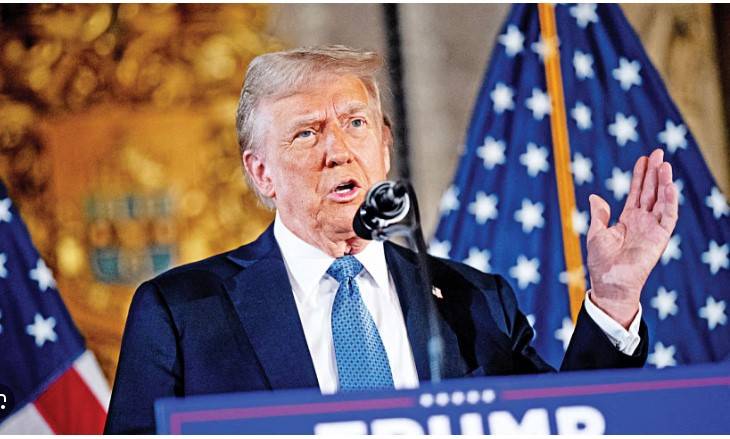US Supreme Court rejects Trump bid to halt hush money sentencing

Stay tuned with 24 News HD Android App

The US Supreme Court on Thursday denied a last-minute bid by President-elect Donald Trump to halt sentencing in his hush money case.
The top court, which includes three justices appointed by Trump, rejected his emergency application seeking to block Friday's sentencing by a 5-4 vote.
The court, in a brief unsigned order, said the "burden that sentencing will impose on the President-Elect's responsibilities is relatively insubstantial" and noted that Trump will be allowed to attend virtually.
The court also noted that Judge Juan Merchan, who presided over the hush money case, has already said he plans to impose a sentence of "unconditional discharge," which does not carry any jail time, fine or probation.
Trump is to be sentenced in Manhattan at 9:30 am (1430 GMT) on Friday after being convicted by a New York jury in May of 34 counts of falsifying business records to cover up a hush money payment to porn star Stormy Daniels.
The 78-year-old Trump, who is to be inaugurated on January 20, is the first former president to be convicted of a crime and will be the first convicted felon to serve in the White House.
In a post on Truth Social following the Supreme Court decision, Trump thanked the court for "trying to remedy the great injustice done to me" and lashed out at Merchan, calling him a "highly political and corrupt judge."
"I am innocent of all of the Judge's made up, fake charges," he said, adding that he will continue to pursue appeals of the guilty verdict in the hush money case.
Trump filed an emergency application with the nine-member Supreme Court on Wednesday seeking to block his sentencing.
Four conservative justices -- Clarence Thomas, Samuel Alito, Neil Gorsuch and Brett Kavanaugh -- were in favor of granting Trump's request.
Chief Justice John Roberts and Justice Amy Coney Barrett, also conservatives, joined the court's three liberal justices in rejecting the president-elect's effort.
Barrett, Gorsuch and Kavanaugh were appointed by Trump.
- 'Grave injustice' -
Trump's lawyers made several legal maneuvers in an effort to fend off sentencing, arguing that it would be a "grave injustice" and harm "the institution of the presidency and the operations of the federal government."
Trump's attorneys also claimed that the immunity from prosecution granted to a sitting president should be extended to a president-elect.
Manhattan District Attorney Alvin Bragg rejected their arguments in his response on Thursday, saying Trump was a private citizen when he was "charged, tried, and convicted."
"Defendant makes the unprecedented claim that the temporary presidential immunity he will possess in the future fully immunizes him now, weeks before he even takes the oath of office," he said.
Bragg also said the Supreme Court "lacks jurisdiction over a state court's management of an ongoing criminal trial" and preventing sentencing would be an "extraordinary step" by the top court.
In the order allowing sentencing to go ahead, the Supreme Court said Trump can still appeal his conviction through the New York state courts.
Merchan said last week that he was leaning towards giving Trump an unconditional discharge that would not carry jail time. He also agreed to allow the president-elect to attend Friday's sentencing virtually instead of in person.
Trump potentially faced up to four years in prison, but legal experts -- even before he won the November presidential election -- did not expect Merchan to incarcerate him.
Trump was certified as the winner of the 2024 presidential election on Monday, four years after his supporters rioted at the US Capitol as he sought to overturn his 2020 defeat.
